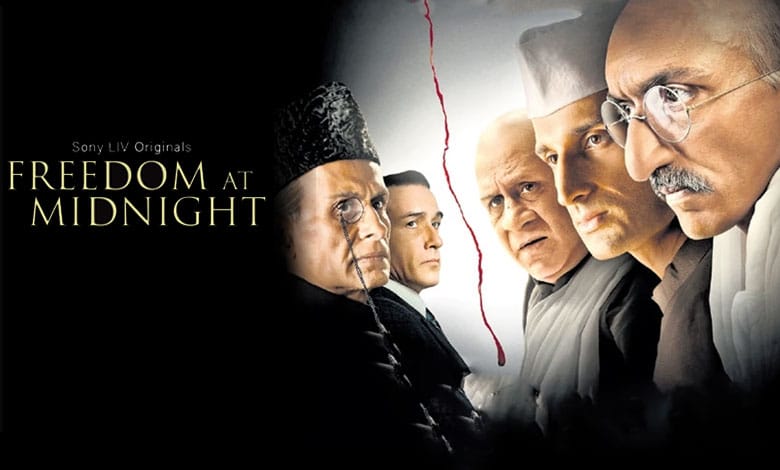Freedom At Midnight: Nikkhil Advani’s Thrilling Take on Partition Politics Captivates and Divides Audiences

The seven-episode series adaptation of *Freedom at Midnight, based on the iconic book by Dominique Lapierre and Larry Collins, reimagines the political turmoil surrounding the Partition of India. Directed by Nikkhil Advani, the series blends history with high-stakes drama, turning the stories of legendary figures like Nehru, Gandhi, and Mountbatten into a fast-paced thriller. However, its bold portrayal of complex historical events has sparked both admiration and criticism.
Table of Contents
A Thrilling Race Against Time
In Freedom at Midnight, time is more than a backdrop; it’s a character in its own right. The series explores the high-pressure environment of India’s independence and Partition, where every decision has life-altering consequences. Advani uses a relentless pacing that mirrors the urgency felt by both the British colonizers and Indian leaders striving for freedom. Time slips away as the clock ticks through the episodes, creating an intense atmosphere where every moment counts. Characters frequently lament their lack of time, with ticking clocks echoing in the background, reinforcing the feeling of an ever-tightening trap.
However, this time-centric narrative device, which initially creates a sense of urgency, becomes overused as the series progresses. What begins as a gripping storytelling technique eventually feels redundant and melodramatic, overshadowing the nuanced political and emotional undercurrents the series attempts to explore.
Historical Drama with High Stakes and Missed Opportunities
While the first episodes set an exciting tone, Freedom at Midnight struggles with uneven execution. The series falters with heavy-handed melodrama, repetitive symbolism, and inconsistent performances that detract from its potential. The writing leans on broad political gestures rather than exploring the complexity of characters and their choices. Advani’s ambitious scope, while commendable, often leads to an execution that feels disconnected from the gravity of the events being portrayed.
Despite these flaws, there’s a deeper resonance beneath the surface. At its heart, the series highlights the difficult process of nation-building — a triumph tainted by tragedy. The personal flaws of iconic figures like Nehru, Gandhi, and Mountbatten are laid bare, offering a fresh perspective on these historical figures. Freedom At Midnight redefines the narrative by showing their vulnerability, internal struggles, and flaws, giving the characters a human dimension that contrasts with the heroic portrayals often seen in mainstream history.
A Reimagined Perspective on Partition Politics
The most intriguing aspect of Advani’s adaptation is its portrayal of figures like Lord Mountbatten and Jawaharlal Nehru. While the source material was criticized for sympathizing with the British perspective, the series manages to present a more balanced view, exploring how India’s own leaders engaged in ideological clashes that led to Partition. The show challenges the traditional narrative of the freedom struggle by not painting the British as the sole villains, instead shifting focus to the Indian leaders’ complex relationships and decisions.
The series delves into Nehru’s personal struggles with the concept of Partition, his vulnerability, and his existential dilemmas. It also portrays Gandhi not as a flawless saint but as a deeply biased leader, particularly in his treatment of Nehru. The most impactful moment comes in Episode 4 when Gandhi confronts his own prejudices, showing a more critical and reflective side of the revered figure.
Perhaps the most compelling character is Sardar Patel, whose pragmatic approach and lack of ego position him as the true architect of India’s independence. His relationship with Nehru, marked by respect and intellectual exchange, provides a refreshing counterpoint to the more ideologically driven characters around him.
The Caricature of Jinnah and the Missed Nuances
However, Freedom at Midnight’s portrayal of Muhammad Ali Jinnah, played by Arif Zakaria, remains a glaring flaw. The series reduces Jinnah to a one-dimensional villain, portraying him as the sole architect of Partition and attributing the violence and division solely to his actions. This oversimplified view of Jinnah, as well as the portrayal of the Muslim League as a monolithic force of divisiveness, fails to capture the complexities of the political landscape at the time. By doing so, the series misses an opportunity to offer a more balanced and nuanced exploration of the events leading up to Partition.
The show’s treatment of the Muslim community, particularly in its depiction of riots and violence, risks perpetuating divisive narratives rather than fostering understanding of the broader context of India’s fractured society during this period.
A Sharp Reflection on Leadership and Nation-Building
At its core, Freedom At Midnight provides a compelling reflection on leadership, ambition, and the fragility of nationhood. It illustrates how the personal ambitions of leaders, driven by insecurities and narrow vision, can unravel the fabric of a nation. The series powerfully critiques the role of fascism in the rise of a new India, highlighting how a leader’s personal failings can have devastating consequences for an entire population.
The poignant moment in the season finale, when Partition is declared as an inevitable fate, encapsulates the ultimate tragedy of the series. The loss of hope, the collapse of ideals, and the irreversible passage of time leave a nation broken and divided, with the past sealed and the future scarred.
Conclusion: A Series That Divides Yet Resounds
Freedom At Midnight may stumble in its execution and overuse of certain narrative devices, but its bold reimagining of history offers a fresh and, at times, daring perspective on the events of Partition. The series challenges conventional narratives, offering a critical, nuanced view of its historical figures, while reflecting on the broader consequences of the decisions made during one of the most tumultuous periods in Indian history.
Despite its flaws, the series succeeds in drawing parallels between the political conflicts of the past and the socio-political tensions of today. In this sense, Freedom at Midnight is not just a historical drama but a living, breathing dialogue that continues to resonate with contemporary viewers.
